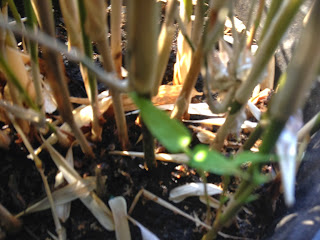Lots of different kinds of people seem to read this blog. Some are my doctor friends, many of whom know way more about everything AML related than I do. Some seem to be people in the former Soviet Union who are trying to learn English (my grammar is pretty good, but sometimes I deliberately use non-standard constructions, so don't rely on it). Some are long time friends and are smart people but don't know their cerebellum from their cerebrum, so we'll start there for today. My medical friends, just skim the next paragraph or two until we get back to the leukemia story.
So, let's talk about the
cerebellum today. The cerebellum (Sara Bellum) is the part of your brain that is in the back and bottom. When you cradle the back of your head with a single hand, I think of that as surrounding your cerebellum. They turn out to be fairly vital pieces of our brains (there's not a lot of wasted real estate in there!) connected with motion and how we move in and through the world. What they told me in med school (and, remember, I did not graduate in the top quarter of my class or even the top third) is something like this: there seems to be a movement generator in the brain that initiates brain impulses for useless movement and the job of the cerebellum is to pare those down to just the useful ones. They say commonly that the cerebellum takes away useless movement the way that Michelangelo took away useless marble. OK, not all that helpful, but it's all I got.
Google probably has a better explanation.
Alternatively, once in my career, I saw a patient with severe cerebellar failure, due to a weird auto-immune thing. His sense of balance was so impaired that he was nauseous just rolling over in bed; he could not sit because he couldn't balance himself; if he reached for something, he would overshoot and then when he tried to correct the
overshooting, would overshoot in a different direction and his speech was very difficult to understand. He was confined to a bed essentially, but had normal thinking and feeling. This is not something one can learn to get better at; I was able to help a bit with meds, but basically, he was going to have to live in a nursing home in bed forever. If rolling over made him nauseous, you can imagine what the ambulance ride from the hospital to the nursing home was like for him. (the video is not my patient and actually shows mild dysfunction)
Additionally, people with severe cerebellar dysfunction often cannot control their
eye movements. To some extent, your visual processing apparatus in your cerebral hemispheres can accommodate to this.
(warning: mention of alcohol below)
Alternatively, again, alcohol intoxication is a different kind of cerebellar toxicity. Think of a very drunk person staggering around or attempting to touch their nose.
(end warning)
One of the main side effects of the chemo for AML is "cerebellar toxicity." I did not give it a whole lot of thought at the time; if forced to choose between incoordinated physical actions and AML, I would have said "Please give me the highest dose possible; I'll put up with the side effects." They test patients' cerebellum before and after giving the dose to make sure nothing has gone wrong and to make sure the next dose doesn't need to be adjusted and I never showed any signs of anything going wrong.
Interestingly, however, I have noticed some subtle differences. (warning: more discussion of alcohol) I have never been a heavy drinker; I frequently will drink two glasses of wine at a sitting, but more than that and I am no longer coordinated and I don't like the loss of thinking ability that comes with more than two drinks for me. However, I would say over the several decades I've been exposed to alcohol, I've had more than two drinks maybe two dozen times so I have a database of how my body responds to alcohol that is fairly consistent. After dose number two, we went out to dinner with a friend and I had one glass of wine. I noticed when we left that I was thinking fine, but stumbling on the uneven flagstones. Usually if I were stumbling on the flagstones, I would also not be thinking well. Hmm. A little bit of cerebellar toxicity. No one asked and I did not want anyone to consider reducing my dose so I did not offer this information. (no more alcohol in this post)
Now, six months out (go, me!), I have some new wonderings. Previous to the leukemia, I would guess that I fell about the usual amount for a normal active person, maybe once every few years. Since the leukemia, I have had four falls (listed in order of least likely to be related to chemo toxicity to most).
1. late May - Maggie saw a squirrel when she was on leash and pulled me over
2. late May - we were moving and I was carrying something heavy and big down the narrow, uneven stairs at our old house and my foot slipped off a stair and I fell (3 of 4 family members as well as some guests have fallen on those stairs prior to my fall)
3. Oct - I didn't see a step in a darkened parking garage and fell quite spectacularly. Was it that it was dark or that I didn't lift my foot high enough?
4. June, 2013 - I was attempting a somewhat acrobatic movement over the garden fence and failed.
The falls were far enough apart that I didn't consider that I had had a dramatic increase in my falling until the recent one. Random chance? Subtle cerebellar toxicity? Weakness as a result of the huge muscle loss associated with two neutropenic fever episodes? Interesting, whatever it is.
My experience is that questions about falling perhaps should be part of survivorship care. It might be an interesting study to ask people to estimate at the time of diagnosis how many falls they have had in the previous year and then to check up on their one year follow up with where they are. It would be an easy study to do in terms of how much data and how much people would need to change their clinical behavior, but hard in that it would take more than the usual 1 or 2 year med student/resident research cycle. If I get to do survivorship care in my clinic (which I would really really like to), I'll add it to my arsenal.
I am grateful that my most recent fall did not result in anything broken and hopeful that I can continue in personal survivorship.

























